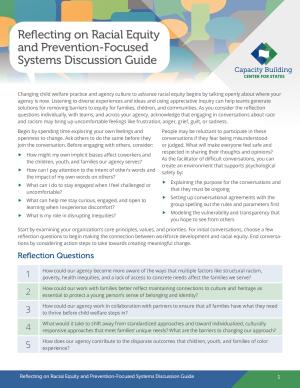Prevention-Focused Systems
The Center for States helps child welfare agencies strengthen the ability of communities to support children and families so that children can thrive at home. Explore the Center’s resources to learn more about preventing maltreatment, preventing foster care entry, and increasing child and family well-being by strengthening families in their communities before problems occur or escalate.
To assist agencies with their prevention efforts, the Center offers publications, digital resources, peer networking, and technical assistance. The Center’s resources can help states establish a vision for prevention, strengthen the prevention continuum (primary, secondary, tertiary) through collaborative partnerships, increase knowledge related to effective prevention services, and partner with youth and families to plan for a more racially equitable, prevention-oriented approach to child welfare.
Looking for resources to support your agency’s response to the FFPSA? Check out the Center’s Family First Prevention Services (FFPSA) page.
Spotlight
Use this collection of resources to help enhance agency culture and climate, identify areas that need attention, and implement improvements.
Browse a collection of publications and digital resources for the information and tools you need to move toward a more prevention-focused system.
Use this collection of resources to support your agency’s prevention planning efforts.
Listen to this podcast series by and about people with lived experience in child welfare and about their partnerships with leaders within child welfare agencies.
Explore collaborative approaches to advance prevention presented by people with lived and professional child welfare expertise.




